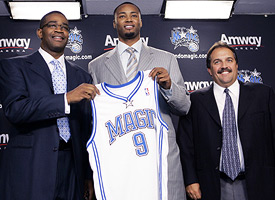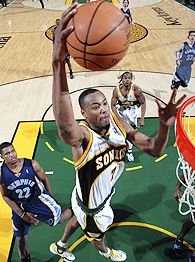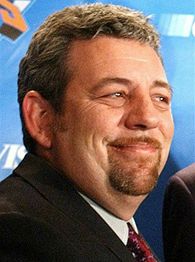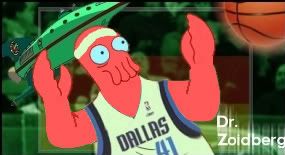 |
|
|
|
#1 |
|
Diamond Member
Join Date: Nov 2006
Location: Decapod 10
Posts: 4,149
           |
Five rules for managing the salary cap (and not paying Rashard the max)
 By Chad Ford ESPN.com  Updated: July 13, 2007 They are popping the champagne corks in Orlando this week, celebrating the signing of Rashard Lewis to a six-year, $113 million deal.  Associated Press Will Otis Smith, Rashard Lewis and Stan Van Gundy be this happy in a few years? Congratulations, Orlando. Good luck with that. History doesn't look kindly on this type of contract. The NBA salary cap can be brutally unforgiving. Manage it well, as the Detroit Pistons and San Antonio Spurs have done over the last five years, and your team has a shot to remain relevant and competitive year after year. Mismanage it, as teams like the New York Knicks, Los Angeles Lakers, Houston Rockets and Minnesota Timberwolves have done, and you have painted your team into a corner. While owners obsess over finding GMs who have a great eye for talent, in the NBA, that's only half the equation. Front-line talent does win championships. But if you can't manage the cap in a way that gives a team a chance to add the right players to your star or stars, talent will take you only so far. We've seen evidence of that in the past few weeks with Kobe Bryant demanding a trade and Kevin Garnett's agent looking for greener pastures for his client. No one doubts that Bryant and Garnett have been two of the 10 best talents in the league over the past decade. But because of bad trades and poor cap management, their teams have been unable to put the right players around them. Here are the five rules every GM in the league should follow. As you can tell, most do not. In fact, a handful don't even understand them. And when it comes to the Lewis signing, I believe Orlando GM Otis Smith violated every single rule. 1. Don't bid against yourself. In other words, don't pay a player more than you have to. This rule seems obvious, but it's often violated. In perhaps the most infamous case, the Knicks gave Allan Houston a six-year, $100 million contract even though the competition could offer him only a five-year, $56 million deal. The Houston contract ended up as a disaster for the Knicks. There are a couple of reasons that the rule gets violated. First, some GMs simply misread the market. They often panic, believing that if they don't offer a certain amount, another team will. Agents work overtime to fuel the perception of the rising market value of their clients. In many cases, the battle between agent and general manager is not a fair fight. On one side you have the agent, a professional negotiator who spends all year thinking about how to drive up the player's price. On the other side you have GMs, many of whom are former players who have seldom handled negotiations. They usually had agents for that. A second main reason is loyalty. Sometimes teams "reward" their own free agents for years of loyal service. The Pistons did that with Chauncey Billups this summer. On the open market, Billups wouldn't have received as much money as the Pistons are giving him. But they felt like he was a key fixture in the franchise and they needed to "make him happy." And, it's worth noting, Billups' contract is far smaller than Lewis'. Overpaying based on loyalty is usually a bad idea, but it's understandable. There's a human element in every negotiation, and it's tough to tell a player that you value that you're going to lowball him because the market stinks in a given year. So what about Rashard Lewis? Why did the Magic give him $113 million? Was there a team out there that would have matched such an offer? No, not even close.  Getty Images Lewis is an offensive force, but max player might be stretching it. His previous team, the Seattle SuperSonics, could have given him a similar amount, but their offer was for far less. The other team with enough salary cap room to offer Lewis a similar contract, the Bobcats, didn't want to spend anything close to that on Lewis. Other teams, including the Rockets, were interested in a sign-and-trade deal, but as a number of teams learned in the past week, the Sonics didn't want to take back any long-term salaries as part of a sign-and-trade. That eliminated virtually everyone else. Not only did the Magic offer Lewis far more than any other team was willing to pay, but they also added an unnecessary sixth year to the deal. Without a sign-and-trade deal between Seattle and Orlando, which the Magic didn't need to do, Lewis was eligible by NBA rules to sign with the Magic for only five years. The sixth year is worth $22.7 million, if paid in full. While only $10 million of it is currently guaranteed, a league source revealed that the remainder will be guaranteed if certain performance incentives are met. According to this source, it boils down to this: if Lewis remains healthy, he'll get the money. The Magic could have secured Lewis with a five-year, $60 million deal. Of course, Lewis' agent and the Magic won't admit that, but that's what the market tells us -- along with a number of GMs and agents. So when the Magic broke the first rule and "bid against themselves," the price was an extra $53 million. 2. Give the max to franchise players only. More GMs are getting clued into this one, but it still gets violated with shocking regularity. If you're going to give a player a maximum-salary contract, he had better be a franchise player. Pay a lesser player that much money and he becomes a millstone around the team's neck. So who qualifies as a franchise player? I think the list is pretty small actually. Here are the players who deserve it: Tim Duncan, Dirk Nowitzki, Steve Nash (the only guy on the list who doesn't have a max contract), LeBron James, Kobe Bryant, Dwyane Wade, Kevin Garnett and Yao Ming. You might consider a max deal for these players as well: Chris Bosh, Gilbert Arenas, Amare Stoudemire and Carmelo Anthony -- and for Dwight Howard, who signed a max extension on Thursday. We can grandfather in a few other players who have shown they were max players in the past -- Shaquille O'Neal, Allen Iverson, Tracy McGrady and Jason Kidd -- though now those contracts seem pretty burdensome. But here are some others players with max contracts: Zach Randolph, Andrei Kirilenko, Paul Pierce, Pau Gasol, Ray Allen, Joe Johnson, Antawn Jamison, Stephon Marbury and Steve Francis. While some of these are very good players, they are not the kind of franchise players that deserve max dollars. What might have seemed like a good deal becomes a nightmare when you realize they can't carry your team. And those contracts make it very difficult to trade them away and get back similar talent. We had two great examples of that on draft night. The Sonics received only the No. 5 pick, a role player and Wally Szczerbiak's bad contract from the Celtics for Ray Allen. The Blazers sent Zach Randolph to the Knicks and had to swallow a $30 million buyout of Steve Francis' deal to make it happen. Lewis just received a max deal, or very close -- as close as the Magic could offer. So is Lewis a max player? Some questions: Was he the best player on his team? (No.) Was his team good? (No.) Is he the best player on his new team? (No.) Do we really need to ask any more questions?  Gregory Bull/AP Photo Knicks owner James Dolan knows all too well the pain of luxury tax. 3. Stay away from the luxury tax. Owners hate the luxury tax -- the penalty that teams pay for going over a certain team salary threshold. While owners like Paul Allen (Portland), James Dolan (New York) and Mark Cuban (Dallas) have shown they are willing to pay the luxury tax, even they have tried to slow down their team's spending. GMs have a way of talking their owners into paying the luxury tax for a specific player. But once the team is there, owners tend to scrutinize every move more closely. In some cases, they don't want to reach to bring in the next free agent, use the midlevel exception or pay a premium to retain their own free agents. It's pretty clear why. When a team is paying the tax, a $5 million contract (plus the $5 million tax) means that $10 million in real dollars is going out the door. That's a lot for a role player who might not even be worth the first $5 million. An unwillingness to pay the luxury tax limits a team's flexibility to make important trades, sign draft picks (that's why the Suns have traded or sold first-round picks for the past four years) and land free agents. It essentially freezes spending and freezes the team. So what does this have to do with Rashard Lewis? Starting with the 2008-09 season, the Magic will have approximately $60 million a year going Lewis, Howard, Jameer Nelson (assuming he gets an extension) and six role players. If they add a draft pick and a midlevel contract, they will be very close to the luxury tax threshold. That's fine if a combo of Howard, Lewis, Nelson, Hedo Turkoglu and J.J. Redick can deliver a championship. But if not, Orlando will have very little flexibility to make significant changes. 4. Keep your options open. This rule really sums up the first three. It's another way of saying, don't overpay. When you overpay, your ability to make additions and even subtractions to a team is damaged. Again, let's look at the Magic. With so much money invested in two players (Lewis and Howard), and without a lot of supporting talent on the roster as trade bait, Orlando will find it difficult to make deals. The team could try to use the expiring contracts of Carlos Arroyo, Pat Garrity and Keyon Dooling to bring in a player or players with longer-term contracts. However, if they do that, they'll run even more risk of crossing the luxury tax threshold (starting in 2008-09). To take advantage of the flexibility that the Magic had before signing Lewis, and to keep their options open for the future (given that it will be extremely hard to trade Lewis), Orlando could have taken a different tack. Had they decided to keep Darko Milicic (with a three-year deal) and pursue free agent Gerald Wallace, they would have potentially made themselves both more competitive and more capable of making moves in the future. Wallace is more than three years younger than Lewis, and he just signed a six-year deal for about half of what Lewis did. Wallace averaged 18.1 points and 7.2 rebounds per game last season, and posted a very similar player efficiency rating to Lewis. He also is a much better defender. While Wallace does not have the kind of outside shot that Lewis does, the Magic have players who do -- especially Redick and Turkoglu. The combined production of Milicic and Wallace will very likely match or outpace what Lewis will do for the Magic this season. Essentially, Orlando is paying him the price of two players. 5. Don't give away assets. This is the rule that most teams follow, which is why many around the league were shocked that the Magic didn't try harder to get something in return for Milicic. Say what you will about Darko -- whether you think he is a bust or still has potential, he is a roster asset. The Magic mishandled the Milicic asset in several ways. First, they gave up their 2007 first-round pick to land Milicic, without being committed to a strategy for this asset. (Detroit used that pick to draft Rodney Stuckey.) Second, they chose not to keep a 22-year-old center, when they said it was their top priority and could have rearranged their roster slightly to do so. Now they have the thinnest frontcourt in the NBA. Third, they essentially gave him away, rather than trading him for another player, a draft pick or a trade exception. Fourth, they mishandled the entire episode to the point where they are ineligible to use the midlevel exception this year. With a sign-and-trade to move Darko to another team and receive an asset in return, Orlando could have stayed slightly over the salary cap and used the exception. By waiving Milicic, the Magic fell a little below the cap and lost their free agent exceptions. Now they can sign only minimum-salary players. Darko's agent Marc Cornstein said more than 20 teams inquired about Milicic once he became an unrestricted free agent, and several teams attempted to work out a sign-and-trade with Seattle and Orlando to land Darko. While Smith said publicly that the team was working feverishly to find a way to keep Milicic, Cornstein said that he received just one phone call from the team after it withdrew its qualifying offer, and the call wasn't related to a deal for Darko. A source in Seattle also said that the Magic weren't very interested in exploring various sign-and-trade scenarios and in the end "just wanted to get their guy and be done with it." Instead of asking Lewis to wait a few days while the team tried to explore trade options, the Magic waived Milicic early Wednesday to expedite the Lewis signing. Later that day Milicic agreed to a three-year, $21 million deal with the Grizzlies. So where does that leave the Magic? The team gave Lewis one of the most lucrative long-term deals in NBA history -- along the lines of historic deals for Shaquille O'Neal and Kevin Garnett. His sixth year salary of $22.6 million (if and when it becomes guaranteed) will be higher than that of all but two players -- Garnett and Tim Duncan. To get the right to pay him that much money, the team renounced or dropped qualifying offers to a whopping 12 players. Two key players for the Magic last season -- Grant Hill and Darko Milicic -- are gone. Once Orlando extends the contracts of Dwight Howard and Jameer Nelson, the team will be essentially capped out for the next five years. This is their team. If the Magic win and win big, no one will care about how much Rashard Lewis makes. But if they stumble, it could be the deal that sucks the Magic right out of Orlando. Chad Ford covers the NBA for ESPN Insider.
__________________
 "Talk to the claw." "They're getting 15, 16 assists some games. I dream about getting 15 assists. It's just not possible with the team I'm on." - Devin Harris about top-notch point guards and him playing with the Mavs "For me, it’s like a kid in a candy store." - Jason Kidd on playing with the Mavs |
|
|

|
| Sponsored Links |
|
|
#2 |
|
Guru
Join Date: Jul 2004
Posts: 15,241
           |
we already have this article posted
__________________
 Contact Me Twitter: www.twitter.com/alnguyen84 Facebook: www.facebook.com/alnguyen84 |
|
|

|
|
|
#3 |
|
Diamond Member
Join Date: Nov 2006
Location: Decapod 10
Posts: 4,149
           |
Sorry, I had a trip to Paris the last four days, so I didn´t notice it.
 Feel free to delete or close the thread. Here is the first post: Link
__________________
 "Talk to the claw." "They're getting 15, 16 assists some games. I dream about getting 15 assists. It's just not possible with the team I'm on." - Devin Harris about top-notch point guards and him playing with the Mavs "For me, it’s like a kid in a candy store." - Jason Kidd on playing with the Mavs Last edited by Dr.Zoidberg; 07-14-2007 at 12:47 PM. |
|
|

|
 |
«
Previous Thread
|
Next Thread
»
|
|
All times are GMT -5. The time now is 08:45 PM.



 Linear Mode
Linear Mode

